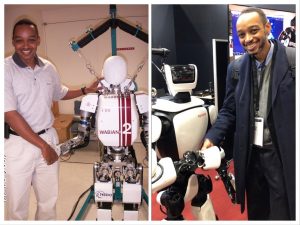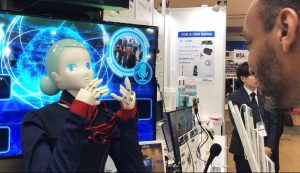
- ARAB NEWS
- 14 Jul 2025

Nader Sammouri Osaka
Can you imagine being able to connect with a robot on an emotional level and even hold it in a carrier like a human baby? In Japan, that is already being done.
AIBO (相棒), meaning ‘partner’ in Japanese, is a series of artificially intelligent robotic puppies designed and manufactured by Sony with a prototype that was first announced in 1998 and new types introduced frequently.
What draws a Japanese person to treat a robotic dog like a human being? And is this phenomena limited to Japanese people due to historical and cultural factors or could it catch on and become a trend in the future?

Interest in AIBO, although predominant in Japan, was able to reach the other side of the globe. Allicia, 26, a medical technologist from the US has been a robot fan since she got her first virtual pet, Furby in 1998 and is now a proud owner of 45 AIBO puppy models.
The price of an AIBO doesn’t come cheap and has an exorbitant price due to its artificial intelligence (AI) software that pushes the robot to interact with its environment differently with each character it faces. Its ERS-110 model for instance costs 250,000 yen (or about US$2,500.)
“I was always interested in how machines worked and also the companionship aspect that robots provided because I had a really difficult time understanding people and making friends. Robots are more straightforward so they were able to provide some level of friendship,” Allicia told Arab News Japan.
This reality prompts numerous questions and exclamation points regarding the extent to which people can find alternatives even when it comes to social bonding.

AIBO was not only a friend to Allicia but also assisted in her search to learn about programming, a fervor she had since she graduated from college in 2015.
“I met AIBO on YouTube and they were the perfect bot that I could get for being complex as well as programmable. Their cuteness was a major plus. I got my first AIBO, an ERS 110 in January 2017 when I could finally afford one then I got her an ERS 210 buddy a few days later because I was curious how different AIBOs act.” Allicia claimed.
She found a practical way to learn programming by surrounding herself with 45 cute programmable robots each with their own unique character.

“I’m sure they activate the same parts of our brains that allow us to form emotional bonds with dogs. Each AIBO also forms a unique personality with their own quirks, which makes them easy to bond with as an individual robot and appreciate the quirks each one has. For example, Phazer the AIBO I have with me, loves to show off, while Kitsune, my 2020 caramel edition is a space cadet who hates naps and loves exploring,” said Allicia who treats collecting AIBO robots as a hobby just like collecting Pokémon.
Arab News Japan also spoke to Aiman Omer, Sudanese robotics scientist and owner of WinRoad RTS, a robotics consultancy company based in Tokyo.
Omer stated that robots like AIBO have the ability to react uniquely to the emotions of the person in front of them and save data of that interaction similar to what people do with their memories but in the form of data, meaning that the robot can learn from its past experiences with the owner and develop to its owner’s habits.
“The robot’s experiences or virtual memories can even be uploaded to the cloud and downloaded to other robots. Hence the machine learning can be transferred,” Omer added.

He expressed that each country could use the robotics technology in a way which serves that specific country best. For example, he claimed that he has seen it being used in Egypt for clearing landmines.
Omer believed that although his company started out at the beginning with a research point of view, his business model now believes that focusing on linking companies in Japan to those in the MENA region comes across as more practical since companies focus on applied advancement rather than theories.

Omer said Saudi Arabia and UAE were technologically ahead in the region due to their government plans and policies for adapting the robot and AI technology into the economy.
In 2006, late Saudi Prince Sultan Bin Abdul Aziz visited Waseda University, one of the top private universities in Japan, where Omer graduated and received an honorary doctorate. At the time, the robot WABIAN-2R gave flowers to the prince at the end of the ceremony. King Salman had also visited Waseda University in 2014 and received an honorary doctorate where the same robot demonstration of giving flowers was made.
Omer also added that a professor from the surgery department of Umm Al Qura University in Saudi Arabia approached Waseda University to seek ideas that include robots solving a problem that they are facing as surgeons.
In today’s world, it might seem that most things are operated by IT and robotics professionals and it might bring some confusion to whether people should start jumping on that career track.
He clarified that idea saying: “New jobs don’t have to require coding. For example, current day managers and human resource professionals could be taking the position of robot managers in the future. Some robots even don’t need programming and coding knowledge to operate. They have certain buttons where you can manipulate and control them kind of like the computer we manage today.”
Navigating Japan and investigating advancements that have been developed from their different perspective of looking at things may definitely be an asset to Arab countries. Building collaborations and starting training programs to raise awareness and gain the tools to understand and operate robots could be a crucial factor to prepare for the years to come.